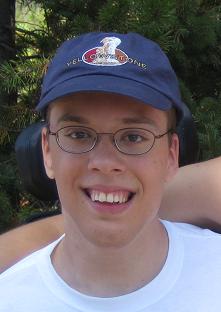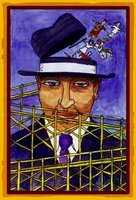Disability Stories and The Media
Yesterday, I heard on the radio two short pieces about young adults with disabilities.
The first, "Student with Cerebral Palsy to Graduate,” was on NPR's Morning Edition. A guest professor who had taught a class at the University of Delaware shared his experience of meeting a student and his mother.
After listening to this story, I felt compelled to write to NPR. I wrote,
“I am 21 years old and, like Sumner Spence, have cerebral palsy. I am so tired of the media’s portrayal of persons with disabilities and their families as either pitiful or inspirational. Both pity and inspiration are two sides of the same coin – the stereotype that people with disabilities are inferior beings; so either feel sorry for us or be inspired when we don’t match imposed boundaries and labels.
Why should a university professor be surprised that a university student would offer “sharp observations” and ask “smart questions?” Because of a wheelchair or weak hands? Not only do students with disabilities have experiences common to all students, we also have a wealth of perspectives shaped by living with our disabilities – perspectives that those who are able-bodied cannot possibly have, perspectives that can add to the diversity of intellectual discussions.”
This story was by no means as bad as those "feel good" sports stories where the kid with a disability is allowed to score a touchdown or make a basket. But I wrote the letter because people with disabilities cannot be respected as full members of humanity until society drops the inspiration/pity stereotype.
Last night, I heard the piece, "The Dog That Changed Her Owner's Life," on BBC Outlook. Hannah Baker, a 21-year-old woman who at one time could barely leave her house because of a seizure disorder, told how her life was changed by a service dog. I really liked how this interview was conducted, because Hannah shared her life experiences in her own words and the interviewer asked deep, thoughtful questions, seeking to understand the whole picture. Most importantly, there were no underlying messages of inferiority or pity or inspiration given to the listener. It was a fascinating story and the young woman’s disability was one part of it.










4 comments:
I agree about your first point. I personally have a intense dislike for media stories about miracle babies.
go david!
wcd
Speaking of sports stories-- I've noticed that with certain coaches, my deaf kids have to "prove" themselves worthy of being on a team. My oldest son is a pretty good baseball player, but in the beginning of the year he batted last and sat on the bench and it took awhile for the coaches to see his ability to play. Never mind that the other kids were dropping balls and had low batting averages and played the entire time. Now, halfway through the season, my son has one of the highest batting averages and is finally playing more.
It's just too bad that some of the coaches can't see past the "disability" and see the ability right off.
I fell 140 feet rock-climbing, July 16, 1983. I was attending University of California Santa Cruz and graduated with a degree in Biochemistry March 21, 1989. I have many experience online too.
My diploma:
http://members.cruzio.com/~awwalton/index.html
Some lab experience UCSC
http://members.cruzio.com/~awwalton/disability/lab.html
Community college lab experience
http://members.cruzio.com/~awwalton/disability/lab_cabrillo.html
and some lecture experience
http://members.cruzio.com/~awwalton/disability/lecture.html
My experience is TBI students are not being served. We are guaranteed a mediocre education. I am smart enough to do well if I keep letting my social life go. After 23 years of doing that, I don't think so. I needed writing help - which was never offered. The loneliness of Friday nights, grinding away on homework that other students breeze through can not be described. Other students had social lives and I watched mine dwindle.
Anthony Walton
Post a Comment